PhD students
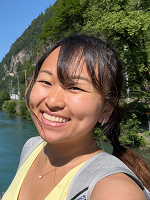
Yuri Takahashi, 2022
Ever since my grandmother gifted me with a microscope during my childhood, I’ve always been captivated by how organisms develop and progressively change shape. Driven by my love for developmental biology, I graduated in 2022 from the University of California, Berkeley in the US with an honors in molecular and cell biology [genetics, genomics, and development emphasis]. During my four years at Berkeley, I worked in Professor Nipam H. Patel’s evolutionary developmental biology lab under the mentorship of graduate student Dennis A. Sun to study the evolution of crustacean Hox regulation. My research methodology was based on how small changes at the genetic level (i.e. CRISPR-Cas9 genome editing of core evolutionarily-conserved Hox regulators) result in organism-level phenotypes (i.e. homeotic transformations). Building on my research experience in the Patel Lab, I hope to pursue the reciprocal question for my PhD studies in the Steventon Lab at Cambridge—“how do perturbations at the system-wide level drive macromolecular-level changes to genetic and signaling processes in cells?” Under the supervision of Dr. Ben Steventon, I will be using gastruloids as a model system to understand the roles of the extracellular matrix in driving germ layer patterning in vertebrate development and morphogenesis. When I am not in the lab, I am usually hiking/camping, traveling, dancing, napping, cooking, or calling my friends and family.
Website: Department of Genetics
Email:
Ever since my grandmother gifted me with a microscope during my childhood, I’ve always been captivated by how organisms develop and progressively change shape. Driven by my love for developmental biology, I graduated in 2022 from the University of California, Berkeley in the US with an honors in molecular and cell biology [genetics, genomics, and development emphasis]. During my four years at Berkeley, I worked in Professor Nipam H. Patel’s evolutionary developmental biology lab under the mentorship of graduate student Dennis A. Sun to study the evolution of crustacean Hox regulation. My research methodology was based on how small changes at the genetic level (i.e. CRISPR-Cas9 genome editing of core evolutionarily-conserved Hox regulators) result in organism-level phenotypes (i.e. homeotic transformations). Building on my research experience in the Patel Lab, I hope to pursue the reciprocal question for my PhD studies in the Steventon Lab at Cambridge—“how do perturbations at the system-wide level drive macromolecular-level changes to genetic and signaling processes in cells?” Under the supervision of Dr. Ben Steventon, I will be using gastruloids as a model system to understand the roles of the extracellular matrix in driving germ layer patterning in vertebrate development and morphogenesis. When I am not in the lab, I am usually hiking/camping, traveling, dancing, napping, cooking, or calling my friends and family.
Website: Department of Genetics
Email:
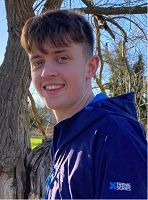
Ben Iddon, 2022
Throughout my undergraduate degree in Natural Sciences, I was drawn to organic chemistry above all other disciplines. I was fascinated by the scope of functionality and behaviour provided by only a small subset of the elements. Supramolecular chemistry takes this one step further by attempting to explain and exploit the intermolecular interactions of molecules. For my PhD, I will be working in the lab of Prof. Chris Hunter developing a system of synthetic polymers which are able to store information through their encoded sequence of monomers and which can undergo high-fidelity replication using specific supramolecular interactions. This enables cycles of replication and mutation to take place which could be used to create oligomers with desirable functions or properties through directed evolution.
Website: Department of Chemistry
Email:
Throughout my undergraduate degree in Natural Sciences, I was drawn to organic chemistry above all other disciplines. I was fascinated by the scope of functionality and behaviour provided by only a small subset of the elements. Supramolecular chemistry takes this one step further by attempting to explain and exploit the intermolecular interactions of molecules. For my PhD, I will be working in the lab of Prof. Chris Hunter developing a system of synthetic polymers which are able to store information through their encoded sequence of monomers and which can undergo high-fidelity replication using specific supramolecular interactions. This enables cycles of replication and mutation to take place which could be used to create oligomers with desirable functions or properties through directed evolution.
Website: Department of Chemistry
Email:
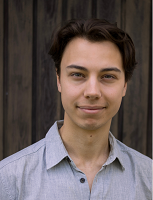
Jonas Roske, 2022
I studied Biochemistry at Freie Universität Berlin in Germany. During my Masters, I used crystallographic and biochemical methods to study a novel class of DNA repair helicases that mediate antibiotic resistance pathways in many pathogenic bacteria. The work elucidated a unique arrangement of auxiliary domains that stretch a molecular ‘rope’ across the loaded DNA strand to assist the processive unwinding activity of the helicase and prevent backsliding. Fascinated by the mechanistic sophistication of such molecular assemblies and protein-nucleic acid interactions, I joined the RNA-division of Prof. Ben F. Luisi’s group at the University of Cambridge to study larger ribonucleoprotein complexes using cryo-electron microscopy. In my current project, I explore the involvement of the bacterial transcription/translation-coupled expression machinery in sRNA-guided mRNA surveillance. For my PhD, I will join Dr. Joseph Yeeles and his group at the MRC Laboratory of Molecular Biology where I will apply my experience in structural protein biochemistry to study the process of human DNA replication on a molecular scale.
Website: MRC Laboratory of Molecular Biology
Email: jr870@cam.ac.uk
I studied Biochemistry at Freie Universität Berlin in Germany. During my Masters, I used crystallographic and biochemical methods to study a novel class of DNA repair helicases that mediate antibiotic resistance pathways in many pathogenic bacteria. The work elucidated a unique arrangement of auxiliary domains that stretch a molecular ‘rope’ across the loaded DNA strand to assist the processive unwinding activity of the helicase and prevent backsliding. Fascinated by the mechanistic sophistication of such molecular assemblies and protein-nucleic acid interactions, I joined the RNA-division of Prof. Ben F. Luisi’s group at the University of Cambridge to study larger ribonucleoprotein complexes using cryo-electron microscopy. In my current project, I explore the involvement of the bacterial transcription/translation-coupled expression machinery in sRNA-guided mRNA surveillance. For my PhD, I will join Dr. Joseph Yeeles and his group at the MRC Laboratory of Molecular Biology where I will apply my experience in structural protein biochemistry to study the process of human DNA replication on a molecular scale.
Website: MRC Laboratory of Molecular Biology
Email: jr870@cam.ac.uk
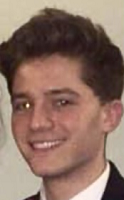
Harry Waller, 2021
I completed my undergraduate degree in chemistry at the University of Birmingham, UK in 2021. Throughout this time, I acquired the utmost enthusiasm for the development of new synthetic methodology. In particular, I became fascinated by the prospect of applying new techniques to complex scenarios; this includes natural product synthesis, site-selective oligonucleotide modification, and compound library enumeration. In my final year, I worked in the Cox group where I focussed on virtual compound library enumeration; specifically, I looked at the pharmaceutically relevant chemical space coverage that could be accessed via the enumeration of a rigid reactive intermediate which contained a privileged scaffold. Using computational techniques to augment chemical synthesis is an area which I remain interested in and hope to explore further throughout my PhD. I look forward to working on the development of practical methods for bioconjugation and small molecule synthesis, based upon visible light-mediated photoredox catalytic platforms, under the supervision of Professor Matthew Gaunt in the Department of Chemistry.
Website: Department of Chemistry
Email: hw574@cam.ac.uk
I completed my undergraduate degree in chemistry at the University of Birmingham, UK in 2021. Throughout this time, I acquired the utmost enthusiasm for the development of new synthetic methodology. In particular, I became fascinated by the prospect of applying new techniques to complex scenarios; this includes natural product synthesis, site-selective oligonucleotide modification, and compound library enumeration. In my final year, I worked in the Cox group where I focussed on virtual compound library enumeration; specifically, I looked at the pharmaceutically relevant chemical space coverage that could be accessed via the enumeration of a rigid reactive intermediate which contained a privileged scaffold. Using computational techniques to augment chemical synthesis is an area which I remain interested in and hope to explore further throughout my PhD. I look forward to working on the development of practical methods for bioconjugation and small molecule synthesis, based upon visible light-mediated photoredox catalytic platforms, under the supervision of Professor Matthew Gaunt in the Department of Chemistry.
Website: Department of Chemistry
Email: hw574@cam.ac.uk
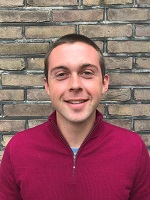
Jonah Walker, 2021
I'm interested in the evolutionary processes which generate the diversity of life around us. Some lineages have diversified rapidly into many species in a short period of time, driven by ecological and/or sexual selection. For my PhD, I am focussing on two such 'radiations': South American ithomiine butterflies and Australian peacock spiders. Specifically, I am studying the evolution of animal signals and the role of hybridisation during speciation in these two groups. My work integrates phylogenomic, comparative, and behavioural analysis in the lab and field in order to gain a more holistic understanding of evolution. I previously read Natural Sciences in Cambridge, before working on several evolutionary research projects prior to this PhD. I've been very fortunate to work on a diversity of different systems, from Heliconius butterflies in Panama to Daphnia waterfleas in Canada, and Podarcis lizards in central Europe to Prinia warblers in Zambia. I have a particular interest in the overlap of human history and natural history. Outside of science, I'm usually found outdoors hiking with friends or chasing wildlife with a camera in hand. I'm a passionate reader, play piano, and frequently attempt sports (badminton, triathlon, and cricket).
Website: Department of Zoology
Email: jmw258@cam.ac.uk
I'm interested in the evolutionary processes which generate the diversity of life around us. Some lineages have diversified rapidly into many species in a short period of time, driven by ecological and/or sexual selection. For my PhD, I am focussing on two such 'radiations': South American ithomiine butterflies and Australian peacock spiders. Specifically, I am studying the evolution of animal signals and the role of hybridisation during speciation in these two groups. My work integrates phylogenomic, comparative, and behavioural analysis in the lab and field in order to gain a more holistic understanding of evolution. I previously read Natural Sciences in Cambridge, before working on several evolutionary research projects prior to this PhD. I've been very fortunate to work on a diversity of different systems, from Heliconius butterflies in Panama to Daphnia waterfleas in Canada, and Podarcis lizards in central Europe to Prinia warblers in Zambia. I have a particular interest in the overlap of human history and natural history. Outside of science, I'm usually found outdoors hiking with friends or chasing wildlife with a camera in hand. I'm a passionate reader, play piano, and frequently attempt sports (badminton, triathlon, and cricket).
Website: Department of Zoology
Email: jmw258@cam.ac.uk
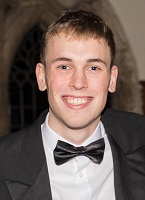
Samuel Harris, 2021
During my undergraduate degree in Biochemistry, the subjects that captured my imagination were developmental biology and genetics. In particular, I was fascinated by the mechanisms by which Drosophila larvae generate their segmented body plan through cascades of interacting transcription factors and key developmental control genes. The perfectly synchronised genetic interactions that dictate this transition are an impressive feat of biological innovation and sparked in me an interest in how complex processes can be broken down into simpler units with rules guiding their interaction. The pinnacle of this concept is the brain, the organ that dictates our actions and behaviours through vast constellations of neural connections. The idea that such complex phenomena could derive from the emergent properties of individual neurons interconnected into complex circuits has led me to want to study neural circuitry in greater depth. For my PhD I will be working at the MRC Laboratory of Molecular Biology, under the supervision of Marta Zlatic. My project will focus on the circuit-basis for different forms of complex learning and memory formation in Drosophila larvae.
Website: MRC Laboratory of Molecular Biology
Email: sh2136@cam.ac.uk
During my undergraduate degree in Biochemistry, the subjects that captured my imagination were developmental biology and genetics. In particular, I was fascinated by the mechanisms by which Drosophila larvae generate their segmented body plan through cascades of interacting transcription factors and key developmental control genes. The perfectly synchronised genetic interactions that dictate this transition are an impressive feat of biological innovation and sparked in me an interest in how complex processes can be broken down into simpler units with rules guiding their interaction. The pinnacle of this concept is the brain, the organ that dictates our actions and behaviours through vast constellations of neural connections. The idea that such complex phenomena could derive from the emergent properties of individual neurons interconnected into complex circuits has led me to want to study neural circuitry in greater depth. For my PhD I will be working at the MRC Laboratory of Molecular Biology, under the supervision of Marta Zlatic. My project will focus on the circuit-basis for different forms of complex learning and memory formation in Drosophila larvae.
Website: MRC Laboratory of Molecular Biology
Email: sh2136@cam.ac.uk
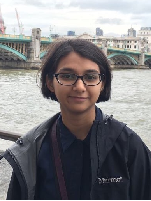
Sneha Parmar, 2020
I completed my undergraduate degree in Genetics, Cell Biology, and Development at the University of Minnesota in 2019. During my time there, I worked in Dr. Melissa Gardner's lab where I studied post-translational modifications in microtubules. I completed an Honors Thesis in my final year for which I studied the binding of the EB1 protein to microtubule tips. Until I begin my PhD studies at Cambridge, I have stayed on with Dr. Gardner to investigate forces along the mitotic spindle prior to chromosomal detachment during mitosis in budding yeast. I look forward to further studying cell division in budding yeast, specifically asymmetry in spindle pole bodies as a PhD student under the joint supervision of Dr. Marisa Segal and Dr. Marco Geymonat in the Department of Genetics.
Website: Department of Genetics
Email:
I completed my undergraduate degree in Genetics, Cell Biology, and Development at the University of Minnesota in 2019. During my time there, I worked in Dr. Melissa Gardner's lab where I studied post-translational modifications in microtubules. I completed an Honors Thesis in my final year for which I studied the binding of the EB1 protein to microtubule tips. Until I begin my PhD studies at Cambridge, I have stayed on with Dr. Gardner to investigate forces along the mitotic spindle prior to chromosomal detachment during mitosis in budding yeast. I look forward to further studying cell division in budding yeast, specifically asymmetry in spindle pole bodies as a PhD student under the joint supervision of Dr. Marisa Segal and Dr. Marco Geymonat in the Department of Genetics.
Website: Department of Genetics
Email:
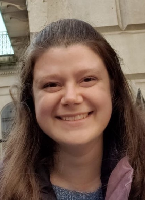
Julie Becher, 2020
Julie grew up in the Boston area of the US. She majored in biological chemistry at Dartmouth College and graduated with honors as a salutatorian in 2018 after completing a Senior Honors Thesis studying the degradation products of insensitive munitions. After helping to teach the introductory chemistry courses for a year at Dartmouth as the Teaching Science Fellow for chemistry, Julie began her MPhil with the Bernardes group at Cambridge in 2019 studying prodrug strategies to target the cytotoxic natural product, beta lapachone, to cancer cells. Targeted prodrug designs that mask the toxicity of chemotherapeutic agents until they are inside cancer cells have the potential to greatly improve patient outcomes by allowing therapeutic dosing and patient quality of life during treatment by eliminating side effects. She is continuing this work in the Bernardes group as a PhD student with the generous funding provided by the Herchel Smith studentship. Outside of lab, Julie enjoys taking care of her plants, sculpting, and she is a huge Boston sports fan.
Website: Department of Chemistry
Email: jbb52@cam.ac.uk.
Julie grew up in the Boston area of the US. She majored in biological chemistry at Dartmouth College and graduated with honors as a salutatorian in 2018 after completing a Senior Honors Thesis studying the degradation products of insensitive munitions. After helping to teach the introductory chemistry courses for a year at Dartmouth as the Teaching Science Fellow for chemistry, Julie began her MPhil with the Bernardes group at Cambridge in 2019 studying prodrug strategies to target the cytotoxic natural product, beta lapachone, to cancer cells. Targeted prodrug designs that mask the toxicity of chemotherapeutic agents until they are inside cancer cells have the potential to greatly improve patient outcomes by allowing therapeutic dosing and patient quality of life during treatment by eliminating side effects. She is continuing this work in the Bernardes group as a PhD student with the generous funding provided by the Herchel Smith studentship. Outside of lab, Julie enjoys taking care of her plants, sculpting, and she is a huge Boston sports fan.
Website: Department of Chemistry
Email: jbb52@cam.ac.uk.
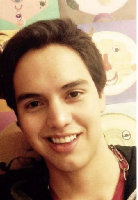
Jose Enrique Gonzalez-Prada, 2020
I grew up in Peru and moved to Cambridge to pursue an undergraduate degree in Natural Sciences. During my studies, I became fascinated by the complex mechanisms whereby wide-ranging drugs interact with their molecular targets. This led me to specialise in Pharmacology, both during my undergraduate studies and later by completing an MSc Pharmacology course at the University of Oxford. This year, I am returning to the Department of Pharmacology for a PhD, with the aim of studying the sensory voltage-gated ion channel NaV1.9 and developing protein modulators of channel function. My hope is that this project, at the interface of molecular biology and drug discovery, will contribute to our wider understanding of the role of ion channels in diseases of dysregulated neuronal signalling, such as pain syndromes.
Website: Department of Pharmacology
Email: jeg58@cam.ac.uk
I grew up in Peru and moved to Cambridge to pursue an undergraduate degree in Natural Sciences. During my studies, I became fascinated by the complex mechanisms whereby wide-ranging drugs interact with their molecular targets. This led me to specialise in Pharmacology, both during my undergraduate studies and later by completing an MSc Pharmacology course at the University of Oxford. This year, I am returning to the Department of Pharmacology for a PhD, with the aim of studying the sensory voltage-gated ion channel NaV1.9 and developing protein modulators of channel function. My hope is that this project, at the interface of molecular biology and drug discovery, will contribute to our wider understanding of the role of ion channels in diseases of dysregulated neuronal signalling, such as pain syndromes.
Website: Department of Pharmacology
Email: jeg58@cam.ac.uk
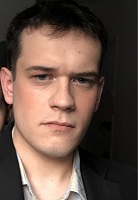
Ignacy Bonter, 2020
My undergraduate research was focused on arsenic and antimony transporters found in early diverging plant groups, such as liverworts. I helped in identifying ACR3 as a functional arsenite transporter in bryophytes, which led to further research regarding the metalloid sensing mechanism in mosses and liverworts. Last year I joined Professor Jim Haseloff’s group for an MPhil degree to again study liverworts in the context of meristem establishment and maintenance. Hopefully during my PhD candidature I will be able to use the open development and ease of genetic manipulation of Marchantia polymorpha to identify key genes and mechanisms involved in meristematic processes, which could be used to synthetically modify development of the plant. I have been interested in how plants develop and organise themselves for years, so I am extremely excited to be able to tackle these issues in my project!
Website: Department of Plant Sciences
Email: kb689@cam.ac.uk
My undergraduate research was focused on arsenic and antimony transporters found in early diverging plant groups, such as liverworts. I helped in identifying ACR3 as a functional arsenite transporter in bryophytes, which led to further research regarding the metalloid sensing mechanism in mosses and liverworts. Last year I joined Professor Jim Haseloff’s group for an MPhil degree to again study liverworts in the context of meristem establishment and maintenance. Hopefully during my PhD candidature I will be able to use the open development and ease of genetic manipulation of Marchantia polymorpha to identify key genes and mechanisms involved in meristematic processes, which could be used to synthetically modify development of the plant. I have been interested in how plants develop and organise themselves for years, so I am extremely excited to be able to tackle these issues in my project!
Website: Department of Plant Sciences
Email: kb689@cam.ac.uk
Alberto Echevarría-Poza, 2019
I was born in Spain and, as I was always intrigued by science, I decided to take a BSc in Biotechnology at the University of the Basque Country. During my undergraduate degree, I had the fantastic chance to take part in several summer projects on Plant Biochemistry and Molecular Biology. After being kindly invited to Dupree’s Lab in the Department of Biochemistry to work for a summer on the plant cell wall, I realised that this was a great place where to keep learning. Now I am starting a PhD on the synthesis and degradation of xylan, a polymer forming the plant cell wall and a source of biofuels and biomaterials. During these years, I will try to learn as much as possible so that one day I can also encourage more people to work altogether for the greater good.
Website: Department of Biochemistry
Email: ae449@cam.ac.uk
I was born in Spain and, as I was always intrigued by science, I decided to take a BSc in Biotechnology at the University of the Basque Country. During my undergraduate degree, I had the fantastic chance to take part in several summer projects on Plant Biochemistry and Molecular Biology. After being kindly invited to Dupree’s Lab in the Department of Biochemistry to work for a summer on the plant cell wall, I realised that this was a great place where to keep learning. Now I am starting a PhD on the synthesis and degradation of xylan, a polymer forming the plant cell wall and a source of biofuels and biomaterials. During these years, I will try to learn as much as possible so that one day I can also encourage more people to work altogether for the greater good.
Website: Department of Biochemistry
Email: ae449@cam.ac.uk
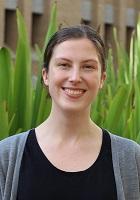
Charlotte Dawson, 2019
Charlotte completed her undergraduate studies in Biochemistry and Chemistry in 2018 at La Trobe University, Australia. She discovered her passion for proteomics during a summer internship in Professor Michelle Colgrave’s lab at CSIRO where she performed targeted analyses of oat peptides. Following this, Charlotte commenced her Honours year with Professor Marilyn Anderson in the Biochemistry department at La Trobe. Her project involved defining protein markers for extracellular vesicles isolated from the pathogenic fungus Candida albicans. For her PhD Charlotte will join the Cambridge Centre for Proteomics under the supervision of Professor Kathryn Lilley. Using quantitative mass spectrometry, she will investigate the RNA-protein interactions involved in the formation of stress granules; specifically how these interactions change in response to cellular insult or during disease pathogenesis. Outside of the lab, Charlotte enjoys playing basketball and has a keen interest in archaeology and ancient history.
Website: Department of Biochemistry
Email: csd51@cam.ac.uk
Charlotte completed her undergraduate studies in Biochemistry and Chemistry in 2018 at La Trobe University, Australia. She discovered her passion for proteomics during a summer internship in Professor Michelle Colgrave’s lab at CSIRO where she performed targeted analyses of oat peptides. Following this, Charlotte commenced her Honours year with Professor Marilyn Anderson in the Biochemistry department at La Trobe. Her project involved defining protein markers for extracellular vesicles isolated from the pathogenic fungus Candida albicans. For her PhD Charlotte will join the Cambridge Centre for Proteomics under the supervision of Professor Kathryn Lilley. Using quantitative mass spectrometry, she will investigate the RNA-protein interactions involved in the formation of stress granules; specifically how these interactions change in response to cellular insult or during disease pathogenesis. Outside of the lab, Charlotte enjoys playing basketball and has a keen interest in archaeology and ancient history.
Website: Department of Biochemistry
Email: csd51@cam.ac.uk

Josh Dickerson, 2019
I studied for an undergraduate Master’s degree in Biochemistry at the University of Oxford, where I became interested in structural biology. I did my 4th year Part II project in the group of Professor Elspeth Garman, where I was studying the effects of radiation damage to proteins during data collection at various structural biology sources. I wrote simulations to track how X-rays and electrons lose energy as they move through protein samples, and used them to suggest how data collection parameters can be optimised to minimise the extent to which radiation damage manifests. For my PhD, I will continue to work on developing structural biology methods joining the group of Dr. Chris Russo at the MRC Laboratory of Molecular Biology. Here I will study the physical phenomena that are currently limiting electron cryomicroscopy and develop methods to improve the resolving power of the electron microscope.
Website: MRC Laboratory of Molecular Biology
Email: jld62@cam.ac.uk
I studied for an undergraduate Master’s degree in Biochemistry at the University of Oxford, where I became interested in structural biology. I did my 4th year Part II project in the group of Professor Elspeth Garman, where I was studying the effects of radiation damage to proteins during data collection at various structural biology sources. I wrote simulations to track how X-rays and electrons lose energy as they move through protein samples, and used them to suggest how data collection parameters can be optimised to minimise the extent to which radiation damage manifests. For my PhD, I will continue to work on developing structural biology methods joining the group of Dr. Chris Russo at the MRC Laboratory of Molecular Biology. Here I will study the physical phenomena that are currently limiting electron cryomicroscopy and develop methods to improve the resolving power of the electron microscope.
Website: MRC Laboratory of Molecular Biology
Email: jld62@cam.ac.uk
